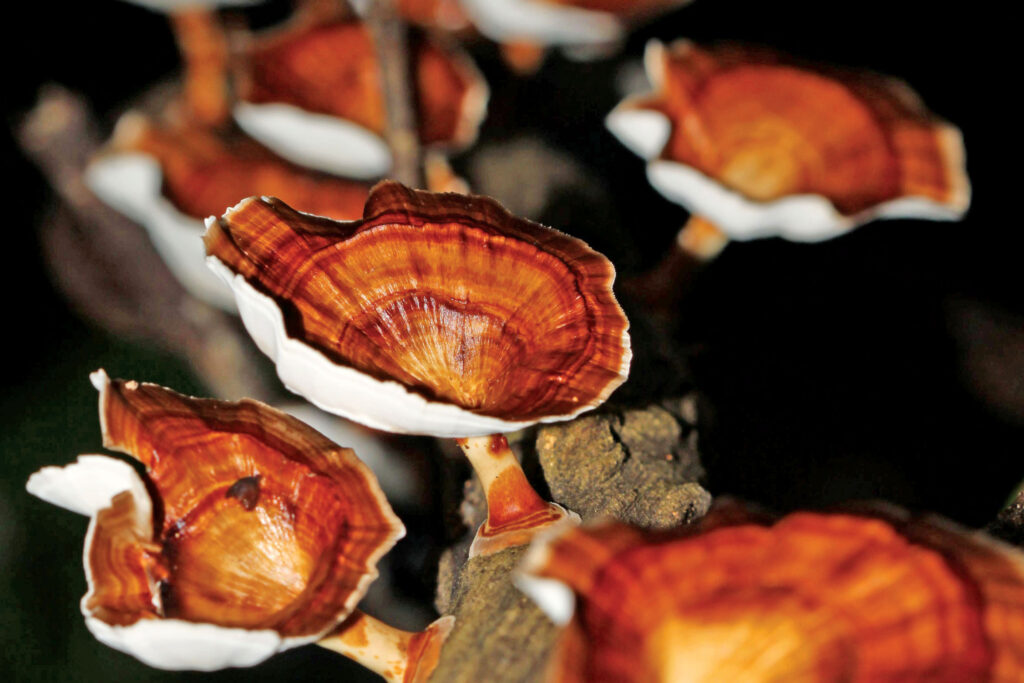Advertisement
Reishi Mushroom
A fascinating fungus

Nature offers a never-ending wealth of health-giving gems. One of them happens to be a fascinating fungus that grows at the base and stumps of deciduous trees, especially Japanese plum trees. What makes the reishi mushroom so fascinating?
Advertisement
Traditional uses
Reishi mushroom, or as it’s known in China, ling zhi mushroom (taxonomic name Ganoderma lucidum), has a long and important history dating back to the Chinese Materia Medica Shen Nung Ben Cao Jing, written between 206 BCE and 8 CE. It was used in the traditional medical practices of Japan, China, Korea, and other countries throughout Asia.
Known as the “mushroom of immortality,” reishi was used to treat a wide range of ailments and revered as a promoter of longevity and vitality. In modern times, reishi has been studied in the treatment of diabetes, cholesterol issues, asthma, and cancer.
Advertisement
Immune function support
In China, reishi is widely used by people with cancer: one study reported that almost two-thirds of its more than 4,000 participants were using this supplement following treatment. Reishi helps preserve immune function in patients with cancer, boosting their internal cancer-fighting abilities.
Advertisement
Cancer treatment support
In 2016, the Cochrane Collaboration, a champion of evidence-based practice, conducted a review of research studies involving reishi in cancer patients. It looked at reishi’s effects on long-term survival, tumour response, host immune functions, and quality of life of cancer patients.
The review’s conclusion was that reishi might be a useful addition to conventional cancer care, possibly improving patients’ responses to chemotherapy while enhancing their own cancer-fighting natural killer cells (NK cells) and T-cells.
Advertisement
Cancer prevention properties
The use of reishi as a preventive agent has received some recent attention as well. Patients with colorectal adenomas—benign lesions with cancerous potential—took reishi extract for 12 months.
At the end of the study, lesions in patients not taking reishi had grown while those in patients taking reishi had reduced in size. Further research is needed to see if reishi could have a role in the prevention of colorectal cancer.
Advertisement
Future directions in research
Research with reishi may also involve its application in inflammatory breast cancer (IBC). Reishi may modify the way genes are expressed by IBC cells, rendering them less invasive and more likely to self-destruct. Although no trials have yet been conducted in humans, this potent mushroom holds some potential to hinder this aggressive form of cancer.
Mushroom formulations
Large carbohydrate-based molecules called polysaccharides lie deep within the tough cell walls of mushrooms and are responsible for immune stimulation. Hot water extraction is the most effective way to release these medicinal compounds.
Encapsulated extracts
Beneficial extracts are taken from the mushrooms and concentrated. Look for hot water extractions that specify polysaccharide content to ensure desired action.
Teas
Mushrooms are traditionally consumed as teas and soups to extract the active ingredients. Polysaccharide content will vary by batch.
Ground mushroom powder
Although “superfine” grinding techniques claim to make polysaccharides bioavailable, the majority of published research is not based upon this extraction method.





